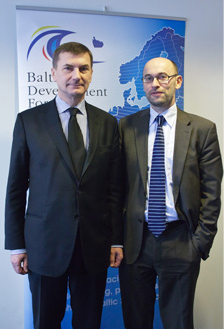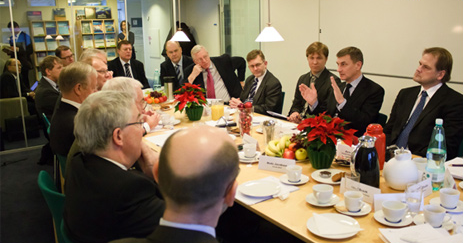Prime Minister Andrus Ansip of Estonia visited the BDF office 8 December, for a business roundtable discussion on economy, the euro and EU’s digital agenda.

Baltic Development Forum hosted an informal roundtable meeting with Prime Minister Andrus Ansip of Estonia, at the occasion of his bilateral visit to Denmark 8 December and talks with his Danish counterpart Lars Løkke Rasmussen. To the meeting were invited a limited number of Danish, Swedish, Finnish and European companies based in the Oresund Region as well as banks, business organizations, consultancy firms and partners that are working closely with Baltic Development Forum. Not least companies within the ICT sector were present in order to address the EU’s digital agenda. The meeting was co-chaired by Uffe Ellemann-Jensen and Henning Dyremose, chairman and member of the board of Baltic Development Forum.
Joining the Eurozone 1 January 2011
Besides presenting the economic and political situation in Estonia before joining the Euro as of 1 January 2011, Ansip underlined the need to work more closely as regards the Digital Agenda which has been presented as a priority area in the EU’s new Growth initiative Europe 2020.
Prime Minister Ansip explained the tough economic reform policy that Estonia had adopted during the economic recession, qualifying the country to join the Euro. Ansip underlined that his country would continue the strict economic policy and he would not allow a softening after joining the Euro. Inflation and budget deficit had to be controlled in the same way as before joining the Eurozone.
Digital Single Market
The roundtable picked up the discussion on the Digital Agenda from the statements made by Andrus Ansip in advance of the European Council in June 2010, where the Europe 2020 strategy was adopted, and during the Baltic Development Forum Summit in June 2010 in Vilnius.
Prime Ministers Andrus Ansip co-signed together with three other Prime Ministers a letter to their colleagues in Europe, underlining that the Digital Agenda was a crucial project for Europe’s prosperity. Today, the EU digital markets function as 27 separate markets, and are burdened by having different rulebooks, the Prime Ministers highlighted in the letter. Andrus Ansip called for transparent, easy and efficient copyright management for the whole EU-market, and added that the consumer policy should facilitate and encourage e-commerce. A new and freer approach was needed in the EU which would enable Europe to assume global leadership. A single and secure digital market for European consumer and providers was necessary, the four Prime Ministers said.
Prime Minister Ansip also highlighted the link between Europe 2020 and regional cooperation by emphasising the need to advance the Digital Agenda through infrastructure development and market integration. As an illustration of the existing obstacles Ansip presented two every-day practical examples: “Why can’t a Swedish entrepreneur create a company in Latvia electronically?” thereby signaling that a shared electronic signature was missing. He also asked “Why can’t a Finnish tourist pay for a parking ticket via his mobile phone in Estonia?”

The digital sectors are well developed in all the countries of the Baltic Sea Region, Ansip underlined, and time had come to remove barriers impeding business. The region should co-operate and take on the role as a laboratory for the EU showing that it is possible to deepen the Single Market through concrete projects and practical initiatives.
E-cataloguing, e-ordering, e-invoice and e-payment were mentioned during the discussion as obvious topics to take up both regionally and on a European level. Other examples were mentioned drawing on the report of Copenhagen Economics on the subject: Integration of the Telecom markets, which was not going to be easy because vested interests were involved. Related consumer policies which could be a big advantage to have harmonized since different rules entailed a very fragmented digital market.
Need to establish a reference group of experts
Henning Dyremose concluded this part of the discussion by saying that the Digital Agenda ought to figure prominently on the Agenda of the Baltic Development Forum Summit in Gdansk, Poland, in October 2011. The Baltic Sea Region could play a facilitating role in advancing this area which could have an immense impact on competitiveness in the Region and in Europe at large. This subject might also provide inspiration during the review of the EU Strategy for the Baltic Sea Region which would take place in the second half of 2011.
A contribution by Baltic Development Forum could hopefully also provide inspiration to the Danish EU Presidency in the first half of 2012 where this issue would be of importance, the participants were informed. Henning Dyremose proposed to establish a “reference group” or a network of experts and specialists, including representatives from the digital industry, which could identify focus areas. Several of the participants agreed to be part of such a group. Prime Minister Ansip supported such an initiative.
After the meeting the Danish newspapers Politiken and Børsen held interviews with Prime Minister Ansip at BDF.
Contact person in BDF: Director Hans Brask, e-mail: hb@bdforum.org
